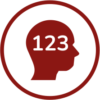
The Multifactor Personality Profile offers a comprehensive view of key personality traits. Through 32 dimensions, it clearly shows how a person approaches other people, solves problems, makes decisions, and what you can expect from them at work. In addition to the personality profile, it also offers recommendations for further development.

The Career Compass Questionnaire maps a person's primary motivators and tells you which job roles are most compatible with their motivation.

A detailed mapping of a person's work style – whether they are typically fast or careful, spontaneous or disciplined, whether they need freedom or rules, and other important information about what you can expect from them at work. In addition to a clear output, you will also get valuable development recommendations.

The Stress Management Questionnaire maps out typical reactions to stress and their usefulness in resolving a situation or for a person's mental well-being. The questionnaire also offers several recommendations for strengthening the ability to cope with stress.

The questionnaire measures the overall level of assertiveness and its four basic components, i.e., the ability to assert oneself, stand up for oneself, work with feedback and establish and develop relationships with others. Unlike the LIFE version, the questionnaire can be applied to situations in the context of working life and is, therefore, primarily intended for job counseling or selection procedures.

Managerial Style QUICK maps the most prevalent managerial styles of a person, within which team or environment they are effective, where they fail, and why. Thanks to the connection to the Multifactorial Personality Profile, it identifies which management style a person has the strongest predispositions for.

The test falls into the 'intelligence tests' category and primarily measures analytical and logical thinking, i.e., the ability to solve unfamiliar situations without prior practical experience or guidance.

It measures thinking capacity and so-called cognitive resilience, i.e., the ability to make prompt and correct decisions despite time pressure and multiple disparate stimuli.

This intelligence test mainly measures numerical skills, i.e., the ability to understand numbers and the relationships between them. It has two parts, one mapping general ability and the other focusing on applied work with numbers and practical numerical operations.